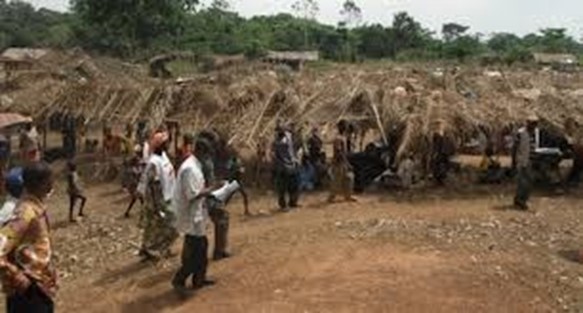20,553 CAR Refugees Arrive DR Congo As Conflict Continues

A new set of Central African Republic refugees fleeing from their war-torn country has begun arriving the Yakoma territory in North Ubangi of the Democratic Republic of Congo.
The refugees were arriving from the neighbouring province of Lower Uele.
According to new figures provided by Edmond Lokame, the Administrator of Yakoma territory, the number of Central African Republic refugees in that part of the country situated about 200 kilometres from Gbadolite, the chief town of North Ubangi and home of former president Mobutu Sese Seko, has risen from 16,906 to 20,553.
The refugees are settling in parts of the localities of Ndayo and Ngazamba as well as in the Yakoma islands.
The territorial administrator expressed grave concerns for the situation of the refugees who are not yet benefitting from any humanitarian assistance.
“They are principally running away from the harassment of soldiers to hide in Yakoma,” Lokame said.
“The living conditions in Yakoma are becoming more and more alarming following the presence of massive Central African refugees fleeing from hostilities in their country of birth.”
“Since these Central Africans crossed over to Congolese soil to date, no assistance in their favour by way of feeding has been forthcoming. With the arrival of new refugees in the Yakoma territory, we fear for the sanitary, security, economic and humanitarian conditions which can provoke various consequences.”
On Saturday, January 9, just before the arrival of the new wave of Central African refugees, the administrator of the territory had alerted the national and international community on the precarious situation in which the Central African refugees, who then numbered 16,906 and had entered the country through the Ubangi river, were living in his administrative unit.
The December 27, 2020, legislative and presidential elections in the Central African Republic led to a spike in tensions and violence in the country leading to mass movement and displacement of the country’s populations to neighbouring countries notably, the Democratic Republic of Congo and Cameroon.
In a communiqué published January 8, 2021, the United Nations High Commission for Refugees (UNHCR) expressed worries concerning the living conditions of the Central African Republic refugees estimated at 30,000 who had fled their country in search of refuge in neighbouring countries especially the Democratic Republic of Congo.
Support Our Journalism
There are millions of ordinary people affected by conflict in Africa whose stories are missing in the mainstream media. HumAngle is determined to tell those challenging and under-reported stories, hoping that the people impacted by these conflicts will find the safety and security they deserve.
To ensure that we continue to provide public service coverage, we have a small favour to ask you. We want you to be part of our journalistic endeavour by contributing a token to us.
Your donation will further promote a robust, free, and independent media.
Donate HereStay Closer To The Stories That Matter




